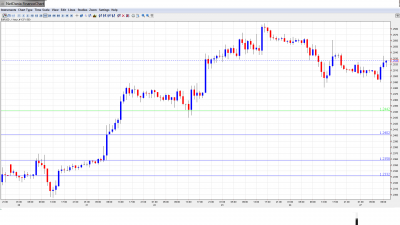EUR/USD is steady after consolidating its big gains last week. However, market sentiment could turn sour as Greek PM Antonis Samaras returned home empty-handed following talks with the German and French leaders. In economic news, German Ifo Business Climate declined, dropping to its lowest level in two years. There are only a few economic releases out of the Euro-zone and the US today as we begin the final trading week in August.
Here’s an update about technical lines, fundamental indicators and sentiment regarding EUR/USD.
EUR/USD Technical
- Asian session: Euro/dollar dropped to 1.2495, and then bounced back above the 1.25 line, consolidating at 1.2502. The pair has made some slight gains in the European session.
- Current range: 1.2520 to 1.2587.
Further levels in both directions:
- Below: 1.2520, 1.2440, 1.24, 1.2360, 1.2330, 1.2250, 1.22, 1.2144, 1.2043, 1.20, 1.1876 and 1.17.
- Above: 1.2587, 1.2623, 1.2670, 1.2743 and 1.2814.
- 1.2623 is a strong line of resistance.
- 1.2520 continues to be tested, and is providing weak support.
- Uptrend support is currently very far.
Euro/Dollar steady on high ground – click on the graph to enlarge.
EUR/USD Fundamentals
- 6:00 German Import Prices. Exp. +0.8%. Actual +0.7%.
- 8:00 German Ifo Business Climate. Exp. 102.7 points. Actual 102.3 points.
- 16:15 FOMC Member Sandra Pianalto Speaks.
EUR/USD Sentiment
- More time or more money for Greece?: Prime Minister Antonis Samaras is seeking an extension until 2016 to meet the bailout targets. Samaras has declared that he only wants more time, not more money, while German officials have tersely responded that “more time means more money”. As part of the 130-billion euros bailout package from the EU and the International Monetary Fund (IMF), the Greek government has committed to sweeping cuts of 11.5 billion euros in 2013 and 2014. However, the Troika must give its approval before Greece can receive the next installment of 31.5-billion-euros. Talks with the troika will continue in September.
- Samaras concludes key meetings as Grexit talk continues: Greek PM Samaras met with the leaders of Germany and France last week, but returned home without any firm promises of aid or extensions. Chancellor Merkel was very complimentary of Greek PM Samaras, but had nothing concrete to offer her Greek guest, stating that Europe was in a “decisive” phase in the debt crisis. French President Hollande stated that he wanted to see Greece remain in the zone, but said that any discussion of delays in Greek repayments could only take place after the upcoming Troika report. Meanwhile, discussions about a manageable Grexit are getting louder: this time from the ECB’s Jörg Assmussen, that echoed Eurogroup chief Juncker. German grumbling is growing over Greece’s request for an extension, and several members of the German government have spoken publicly of a possible Greek exit from the eurozone and their objection to additional time or money for Greece. See how to trade the Grexit with EUR/USD.
- Spanish aid getting closer: After Germany’s approval, came reports about ongoing negotiations between Spain and its European peers regarding a formal aid request. This isn’t too surprising, but it gave the euro a boost. A formal aid request could be made as early as August 31st. Spain’s austerity program continues, with an increase in sales tax set for September 1. Meanwhile, Spanish 10 year bonds have been steady, with yields of about 6.40%.
- Doubts about QE3 in September: After the euphoria from dovish meeting minutes, doubts began to rise. FOMC member James Bullard said that markets are overpricing the chance of QE3. He also said that the minutes are already stale. Indeed, the Fed discussed other options and the economy has been improving since then. Even the weak manufacturing sector has seen a positive sign: Markit’s initial PMI for August was better than July’s. There are numerous reasons why QE is far from certain in September.
- The euro and Spanish bonds react positively after report over ECB cap: Following Geman media reports, speculation persists that the ECB intends to cap peripheral Euro-zone bond yields, perhaps as early as September. The process could look like this: After Spain finally submits its request for aid, the ECB will buy bonds en masse, and will defend a preset yield like the SNB defends the EUR/CHF floor. Such a strong commitment will likely calm investors, as long as the ECB doesn’t have seniority. For its part, the ECB dismissed the media report, calling it “absolutely misleading”. Despite the ECB denial, the euro has moved up and Spanish bond yields are down.

